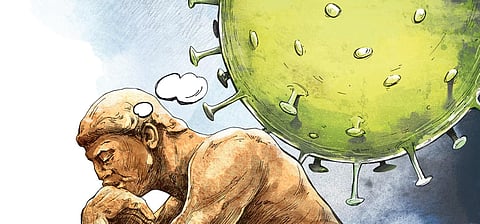

Any assessment of the socio-economic and human dimensions of the current calamity sweeping the world can only be woefully inadequate and flawed. Any policy prescription made now is bound to be partial as the complexity, interconnectedness and sweep of the consequences of the pandemic are yet to fully dawn on us, immersed as we are in the fight against the virus. However, a few key lessons of the pandemic-induced responses are important pointers towards preferred recovery strategies. These lessons should be seen as history’s coded messages. Failing to make sense of them could be an opportunity foregone. This is a Black Swan moment as elucidated in the eponymous book of 2007 by Nassim Nicholas Taleb, who asserts that “Black Swan logic makes what you don’t know far more relevant than what you do know”.
The first and foremost lesson is that sovereign might—in terms of money, influence, technology or combat capabilities—does not dictate the course of history. Human projections and forecasts have been repeatedly belied by forces mightier than what man could imagine. While logical calculations are essential for any organisation, including the state, the ever-present possibility of our calculations being invalidated by unimagined denominators should make us humbler. This implies that possibilities have seeds of threats within them even as setbacks contain seeds of opportunities.
While uncertainty is a certainty, all uncertainties need not necessarily lead to gloom. The pandemic has challenged the dominant ideology and premises of economic growth in several countries. Rebuilding the economy on the very same premises will be foolish and futile. Adaptability and agility are the essence of survival. Governments should be bold enough to re-evaluate their blind ideological adherence, acquired prejudices, patronage to crony capitalism, familiar obsession with immediate political benefits and anything that has the potential to divide and alienate a beleaguered population.
Another key lesson is the value of cooperative federalism, amply demonstrated at a global level and admiringly expressed at the national level in our country. Chief ministers belonging to political parties with polar differences in ideology work in tandem with the prime minister in our war against this epidemic. Without that harmony of purpose, the spectre of India’s inherent vulnerabilities would have assumed menacing dimensions and several thousand lives would have been lost. It should also dawn on us that the economy does not move only on selected and elite wheels but on all the four wheels. There cannot be an economic recovery that is good only for the rich or only the poor. The cardinal truth of interconnectedness is a major lesson that should guide our policies in the post-Covid recovery phase.
The recurrence of such epidemics within short intervals raises challenging scientific questions. We are forced to ponder whether man and nature are playing an inherently dangerous game of hide and seek. Leaders like America’s Donald Trump and Jair Bolsonaro of Brazil, who consistently deny the distressing fact of global warming for fear of being forced to make changes to a hyper-consumerist development model, will now be (hopefully) forced to think seriously as to who the final winner will be in this war with nature. Nature’s ammunition is beyond human comprehension and the development trap that humanity is in can only accelerate greater disasters. Developing nations have been vying with each other to be like the developed ones, following the same suicidal strategies of the 20th century. In the post-Covid phase, it will be alarming to follow the same old strategies for speedy economic growth. It is time we follow scrupulously the environmental laws we ourselves have enacted without giving a chance for the might of money to ride roughshod over them.
Several states have demonstrated that during this battle against the coronavirus it is the resilience of the government machinery that has saved us. It could deliver services to the most needy and bring succour to them. Kerala has been a sterling example of a robust public healthcare system and an efficient public distribution system. It is time to rethink policies that fashionably urge the state to retract from as many sectors as possible and bask in the efficiency of the private sector. It may be recalled that successive Union governments have been bending backwards to eulogise privatisation of government utilities including hospitals! It is these very utilities that have been our bulwark in this crisis.
The unexpected crisis also brought to the fore the utility and effectiveness of the official machinery. The selfless service of the medical fraternity is self-evident. But the value of the services rendered by officers and functionaries who managed the practical issues at various levels across India and the police personnel needs to be recognised. In the post-Covid phase, this machinery has to be further calibrated and kept in fine fettle as the effective instrument in our revival strategy. That should also be the chosen moment in our history to purge corruption out of our system by reinforcing moral probity in public life.
The virus outbreak is a game changer and the post-pandemic phase calls for a brave new policy ecosystem. Revival of the economy and restoration of social confidence is as much a moral and humane mission as it is an economic and administrative endeavour of daunting magnitude.
K Jayakumar
Ex-Kerala Chief Secretary & ex-VC, Thunchath Ezhuthachan Malayalam Varsity
(Email ID: k.jayakumar123@gmail.com)